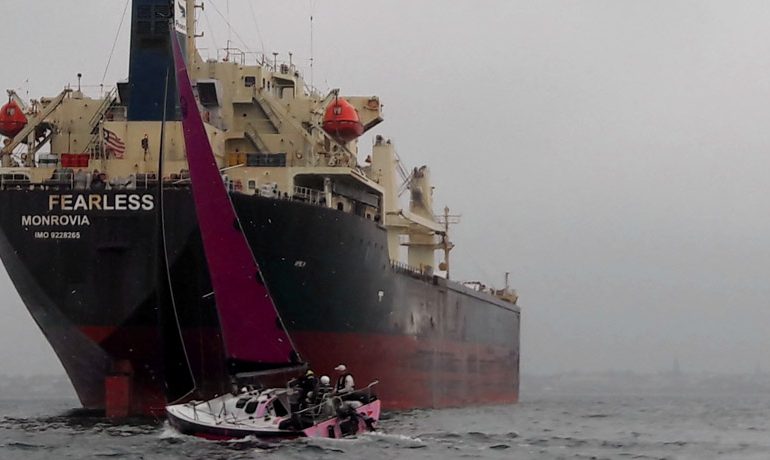‘It’s about your mind, your energy and getting help from others’: Interview with Natasha Lambert
Natasha Lambert BEM is a multi-award-winning disabled sailor and adventurer. Since 2012, Natasha has completed multiple sailing challenges on her yachts, the catamaran Blown Away and the monohull Miss Isle Too. Natasha has traversed the British, Irish, and Mediterranean seas, an Atlantic crossing in the middle of the Covid-19 pandemic, and the Capital Venture Challenge, in which she raised £8,000 for her own charity, the Miss Isle School of Sip Puff Sailing.
Sip and Puff Sailing is a technology developed by Natasha’s Dad, allowing Natasha to sail as a quadriplegic by using her mouth. The technology has received universal acclaim, and as mentioned in the interview, will be on permanent public display in September 2022 at the National Maritime Museum in Greenwich, London.
Reliance chatted to Natasha about all things sailing: her future plans to complete a trans-Pacific crossing, her passion for fundraising, and the importance of independence and interdependence in sailing.
*This interview was conducted over Whatsapp message.
Reliance: Hi Natasha, tell me what you’ve been up to recently.
Natasha Lambert: Ok, my boat is in Valencia at the moment – it has just had some work done – antifouled services, etc. and it is just being lifted into the water today!
I am at home in Cowes now and have just been doing some talks about diversity at local schools. I am hoping to go sailing in Blown Away to Greece in the next few weeks, cruising the Ionian islands this summer. I also have a small monohull here in Cowes I sail as a day boat. I am hoping to sail through the Panama Canal and across the Pacific in the next year or so if it can be planned and arranged, but it’s a lot of work and I’m still trying to convince my mum and dad who have to organise the financial side and funding!
If I can sail the Pacific I will raise money for charity again.
R: So lots of exciting things happening now and lots of exciting things in the future!
It’s interesting you mention the important role of your parents; as a logistics company, we wanted to chat with you today about the significance of organisation in sailing. As a sailor and as a disabled sailor, you must appreciate how much prep goes into a sport that looks and feels so free once you’re finally under sail.
What kind of organising and logistical support will need to happen in order to achieve your goals of sailing the Pacific?
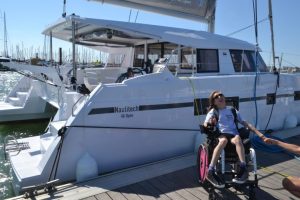
N: My Mum and Dad up until now have organised everything themselves, but if I’m going to sail the Pacific we will need to get my boat, Blown Away, from the Med, across the Atlantic again – although I’d like to do that I don’t think my Mum and Dad do! So we will have to get it either delivered under sail or by ship to the Caribbean, then I would sail to either New Zealand or Australia, and then we have to think about getting the boat back home! So it’s quite a big project !!!!
I will also have to have a crew, we think it is a long sail and we will stop over on different islands and will probably need crew changes.
R: Absolutely, it sounds major – three big crossings and you will be captain of at least one of them!
There’s so much work involved in sailing, do you think of sailing as a solo sport or a team one?
N: Team definitely. It takes lots of people to help me: Dad does all the tech stuff, like the adaptations I need and my sip puff system, and my mum organises phone calls and emails, picking things up and drives me around. I have a sailing coach. We train with either RNLI or other organisations, etc. Plus there are 2 carers to assist me.
R: You once said in another interview that it’s great that so many people recognise and support your work, ‘but really anyone could do it.’
Sailing is never a one-person endeavour, even if you do it alone you still need a boat and lots of equipment. Do you think sailing is an accessible sport?
N: Yes I do think it’s accessible if you have positive people around you and people willing to help. There are some really good organisations about now!
R: A good support network is essential! What organisations are you thinking of?
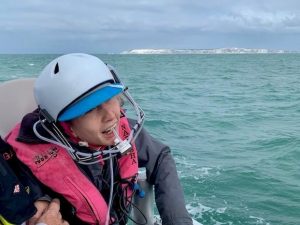
N: Depends where people are in the country or which country! RYA Sailabilites – we even visited a Sailability when we were in Antigua – they help lots of people. Depends on what disability you have – some have more adapted boats than others. With Mum and Dad’s help, we run a small charity to help people with complex needs sail like me with a sip puff system too.
Miss Isle School of Sippuff Sailing!
R: That name is so good! How long have you been running the charity?
N: Since July 2015. I sailed from Cowes to Tower Bridge in London to raise money in order to set it up.
R: You mentioned raising money as part of your Pacific crossing in the future, how important is fundraising to you?
N: Very – it means I can take part and feel a part of my community. I feel like I’m doing a job to help, it’s my way of helping.
R: I think it’s very powerful what you said about fundraising giving you a sense of agency and feeling part of the community. Is that what drew you to sailing in the first place? This sense of agency and community?
N: I liked sailing before but fundraising gives me more purpose. It makes me want to do challenges rather than just sail, although that’s nice too. Doing challenges, it’s more work and harder but it means I get to meet more people. Helping to do something for someone else is great because normally I have to have people helping me, so this way I get to do something in a special way – I hope that makes sense!
R: No it makes complete sense! Sailing and fundraising make you feel independent and in charge, but they are also activities that highlight how much we depend upon each other as well, it’s amazing.
N: Yes that’s right!
R: I saw that nearly a year ago now, your sip and puff system is now exhibited at the Greenwich Maritime Museum, how does it feel to be recognised as such an important part of sailing history?
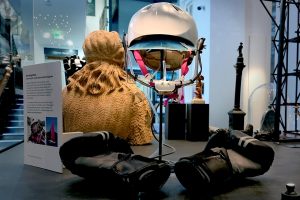
N: Oh that was amazing! We were very surprised and honoured to have the Royal Museum contact us. Both I and Dad feel very proud, as it’s really Dad and the software he designed that allows me to sail. We went up to the museum about 3 weeks ago to see it. It was a little strange seeing my helmet on display in a case, but it looks fantastic. I have been invited up to the museum on the 10th of September to meet the Mayor of Greenwich and museum directors and to cut a ribbon on the exhibition and do a Q&A session – so looking forward to that
R: Oh that’s exciting! I’ll put it in my diary! You mentioned at the beginning of our conversation that you were talking at a school recently, how important are public engagements to you?
N: Oh really important, especially with children as they are the next generation – they ask some great questions! But hopefully, they will remember someone like me visiting their school and that it’s possible to do all sorts of great things with the right support and teamwork, no matter your ability. It’s about putting your mind and energy into something to make it work and getting help for things to work. Hopefully, people will remember me and see that anything’s possible
The school that I visited, I actually went to 15 years ago; it didn’t work for me, I didn’t have the right support, and so Mum and Dad took me out of school and home educated me. Although odd to go back, it’s a really good thing and things are changing for the better for special needs education.
I’ve also done talks with mum and dad and my sailing coach at sailing clubs, RYA conferences, and even for JPMorgan.
R: Wow, that’s such a powerful journey full circle. I think disability justice and awareness have made such leaps in the last decade. As you say, being visible and vocal is so important to inspiring people and creating change.
What do you think needs to happen in the sailing world in order to make it more accessible and increase diversity?
N: Hmm I’m not sure but I think the more disabled people that sail the better, and if it is visible and people can talk about what’s needed then more and more adaptations and help will continue to come available so I guess it’s keeping disabled sailing in the spotlight so more and more will take it up so more funding will be available.
R: I think you’re right, it’s what drove your dad to create the sip and puff technology right? Your love and sailing and desire to do more created the technology and now more and more disabled people are sailing.
What’s next for you?
N: I like giving talks and I’d like to do more social media about how beneficial sailing can be. Maybe do some Youtube vlogs/short films about my sailing.
We gave some of our footage to a couple of guys we know who have made it into a documentary about my sailing and they are trying to sell it to a media company. They also filmed me sailing here too and took videos of us all at home. I think it’s about a 20-minute documentary.
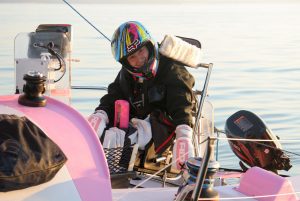
We are meeting them again this weekend to see if they have any updates but they are also keen to know my plans for the next challenge, it would be fab if they could film some of the Pacific crossing.
R: Video is such an easy way to reach people nowadays and I think it’s the best way to see sailing in action.
What would you tell someone who wanted to give sailing a go but maybe wasn’t sure if it’s for them?
N: I would definitely say have a go and try it – make sure to try it with someone who can give you all the information you need, so ask as many questions as you can before going out [on the water], so you are confident.
Thank you to Reliance Yachts for helping get Blown Away off the ship in Palma. It was a great help and definitely a relief for my Dad to have the help! If we do decide to do the Pacific, we will contact Reliance Yachts for some advice regarding entering and clearing into various counties and the Panama Canal!

